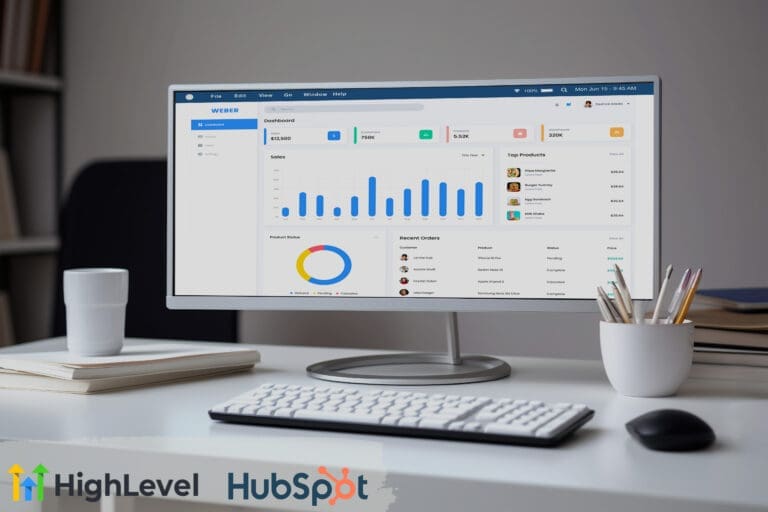ClickFunnels is a widely recognized funnel-building platform, offering users an all-in-one solution to create sales funnels quickly.
However, while it’s popular, ClickFunnels comes with limitations—high costs, limited customization, and lack of ownership over your site.
For businesses or individuals looking for more flexibility and control, WordPress is an excellent alternative.
In this guide, we’ll dive into why WordPress is a powerful alternative to ClickFunnels, offering comparable (or better) features through plugins, themes, and integrations—all at a fraction of the cost.
We’ll explore how you can create high-converting funnels, automate marketing, track analytics, and scale your online business using WordPress.
1. Cost Comparison: WordPress vs. ClickFunnels
ClickFunnels is known for its high pricing, with plans starting at $97/month and going up to $297/month for advanced features.
This can be a significant investment, especially for small businesses or individuals.
On the other hand, WordPress is an open-source platform that offers greater flexibility with pricing.
- WordPress Hosting: Depending on your choice of hosting, you can start as low as $15/month.
Premium-managed WordPress hosting options like CloudWays, Nexcess, Pressable, and WP Engine are perfect for scaling and performance. - WordPress Plugins: You only pay for the tools you need, and many essential plugins have free versions or are much more affordable than ClickFunnels.
By opting for WordPress, you can save hundreds of dollars each year, especially as you scale your business.
2. Customization and Flexibility
While ClickFunnels is designed for simplicity, it limits how much you can customize your site or funnels.
With WordPress, the possibilities are nearly endless.
You can build a site and sales funnel tailored exactly to your needs, with full control over every design element and functionality.
Themes like Astra and Divi are popular choices, both offering lightweight, highly customizable designs optimized for performance.
Coupled with drag-and-drop builders like Gutenberg or the Divi Builder, you can create professional, high-converting sales funnels and landing pages without any coding knowledge.
3. Plugins to Replicate ClickFunnels Features
WordPress shines when it comes to replicating and surpassing ClickFunnels’ funnel-building capabilities.
Here are the key plugins that can help you create similar funnels with enhanced features:
Sales Funnels:
- WP Funnels: This powerful funnel-building plugin allows you to visually design and set up sales funnels from scratch.
With easy-to-use templates, A/B testing, and one-click upsell/downsell options, WP Funnels is a great alternative to ClickFunnels. - CartFlows: Another top funnel-building plugin that integrates seamlessly with WooCommerce, CartFlows offers the ability to create optimized sales funnels with upsells, order bumps, and more.
Lead Capture:
- Fluent Forms: For capturing leads, Fluent Forms offers advanced form-building capabilities, including pop-ups, multi-step forms, and integration with email marketing tools.
- OptinMonster: If you’re looking to create highly customizable lead capture forms and exit-intent pop-ups, OptinMonster is another great tool to boost conversion rates.
Email Marketing & Automation:
- MailMint: MailMint handles email marketing automation and integrates directly with WP Funnels, making it easy to send follow-up emails based on user behavior.
- FluentCRM: This is a native WordPress email marketing automation and CRM tool that helps you manage your leads, create automated workflows, and send targeted email campaigns.
- HubSpot: A well-known CRM and marketing automation platform, HubSpot integrates with WordPress to manage contacts, automate emails, and track customer journeys.
- AffiliateWP: For businesses looking to create an affiliate marketing program, AffiliateWP integrates easily into WordPress to manage affiliate tracking, payouts, and performance metrics.
Learning Management Systems (LMS):
If you’re selling courses online, WordPress provides excellent LMS plugins like:
- LearnDash: One of the most popular WordPress LMS plugins, LearnDash allows you to create and sell courses with powerful features like quizzes, lesson timers, and drip content.
- Restrict Content Pro: For those looking to create membership sites with protected content, Restrict Content Pro integrates seamlessly with LearnDash or works as a standalone membership solution.
4. Scalability: Growing Your Business with WordPress
ClickFunnels may work for beginners, but as your business grows, it can be restrictive. WordPress, on the other hand, is highly scalable.
With the right hosting provider, such as Kinsta, WP Engine, or Nexcess, your site can handle increasing traffic, faster load times, and enhanced security, all without the rigid limitations of ClickFunnels.
Additionally, by using plugins like WP Funnels and CartFlows, you can easily expand your sales funnels, add more steps, and optimize for higher conversions as your business scales.
5. SEO Capabilities: Drive Organic Traffic with WordPress
Unlike ClickFunnels, which offers limited SEO tools, WordPress excels at search engine optimization (SEO).
By using plugins like All in One SEO and tools like Semrush, you can fine-tune every aspect of your site to rank better on search engines.
These plugins allow you to control meta titles, descriptions, keyword targeting, and more, helping you drive organic traffic and reduce your dependence on paid ads.
6. Analytics and Tracking: Get Full Insights
Tracking your website performance is key to understanding how your sales funnels are performing.
WordPress gives you access to some of the best analytics tools available:
- MonsterInsights: The go-to plugin for integrating Google Analytics into your WordPress site, MonsterInsights offers easy-to-understand reports on traffic, behavior, and conversions.
- Jetpack: In addition to security features, Jetpack also provides basic analytics for tracking your site’s performance.
ClickFunnels’ built-in analytics can feel limited, whereas WordPress allows for deeper integration and tracking through these powerful tools.
7. Security and Backups: Own and Protect Your Data
With WordPress, you have full control over your site and data. Plugins like Jetpack Security and Solid WP ensure your site is secure from hackers.
while hosting providers like Pressable offer built-in security measures. Regular backups, firewalls, and two-factor authentication are easily implemented, giving you peace of mind.
ClickFunnels, being a hosted solution, handles security for you, but it also means you have less control over your own data.
8. Ownership and Control: Why WordPress is Superior
One of the biggest advantages of using WordPress over ClickFunnels is ownership.
With WordPress, you own your site, your content, and your data.
You’re not tied to a proprietary platform that could increase prices, change policies, or limit your options.
This control is crucial for long-term growth and success.
Conclusion: WordPress is the Ultimate ClickFunnels Alternative
While ClickFunnels offers a quick way to build sales funnels, it lacks the flexibility, scalability, and cost-effectiveness that WordPress provides.
By leveraging WordPress, you can create sophisticated sales funnels, automate your marketing, and scale your business—all while owning your data and site.
With tools like WP Funnels, CartFlows, MailMint, FluentCRM, and LearnDash, you can replicate (and surpass) ClickFunnels’ features for a fraction of the cost.
Pair them with powerful hosting like CloudWays or Nexcess, and you’ll have a high-performing, fully optimized funnel system to grow your business.
By choosing WordPress, you’re not just building sales funnels; you’re building a business platform that gives you full control, flexibility, and the potential to scale.




